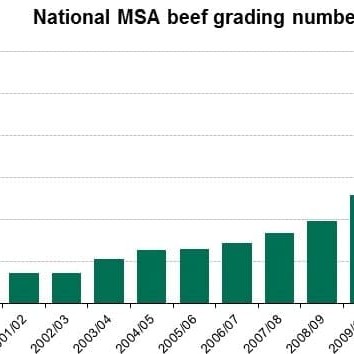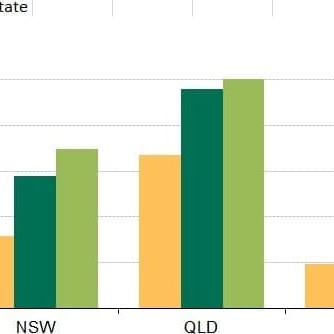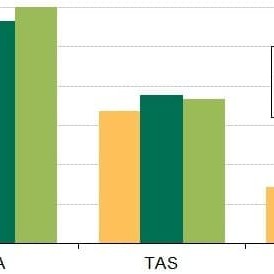Growth in Australia’s world-leading Meat Standards Australia grading system shows no signs of slowing, with figures revealing there were more than 2.4 million head of cattle graded nationally under the program in the financial year ended June 30.
The graph pictured here shows that if anything, MSA’s momentum has gathered pace over the past two years, after cracking the two million head milestone in the 2011-12 year.
 The biggest driver of that recent trend, of course, is Woolworths, which adopted MSA across its regular supermarket beef offer in January 2012. That provided six months’ worth of input into MSA’s 2011-12 yearly performance results, but a full 12-month contribution to the latest financial year.
The biggest driver of that recent trend, of course, is Woolworths, which adopted MSA across its regular supermarket beef offer in January 2012. That provided six months’ worth of input into MSA’s 2011-12 yearly performance results, but a full 12-month contribution to the latest financial year.
But the trend goes far deeper than just the ‘Woolworths factor’ – adding about 8000 head per week to the national MSA tally – with solid growth seen in processor, food service and retail engagement, and producer accreditation numbers.
MSA has recorded growth in numbers graded of 16.8 percent (349,000 head) over the past 12 months, to reach 2,417,048 head last fiscal year. To put the recent trend in perspective, it was only in the 2009/10 year that MSA grading reached the million head milestone for the first time.
As the graph shows, the program had a tough grind in its early years, showing only very modest growth from its launch back in 1998 due to lack of interest among larger processors, supermarkets and many independent butchers. The whole existence of MSA was under jeopardy at one point, so disappointing was the industry uptake.
The real catalyst for change happened when major processors – firstly Teys, and then JBS and Nippon – started processing for MSA in 2009, later joined by large retailers like Woolworths.
Coincidentally, Woolworths released its 2012-13 financial year report yesterday, singling-out the sales performance of its MSA fresh meat offer for mention, suggesting it had experienced double-digit growth over the past 12 months.
While the adoption of MSA by Woolworths through its own supply chain last year is the biggest single factor behind MSA growth in the 2012-13 year, there are a range of other influences:
- Further growth in grading numbers among existing MSA-licenced processors, in some cases ratcheting-up their throughput to supply Woolworths with MSA boxed beef, to supplement the supermarket’s own supply chain. For example it is well known that Teys Australia’s Naracoorte and Wagga plants have both lifted MSA throughput over the past 12 months. ‘Most’ of the kill at both plants (Wagga 1300/day, and Naracoorte 800/day) is now MSA cattle.
- License adoption by several new beef plants which previously did not kill MSA cattle
- Organic growth in throughput for processors feeding into the Coles supermarket supply chain. While Coles itself (with a couple of small exceptions) does not apply MSA for its regular beef offer at retail level, supply chain partners like Australian Country Choice are licensed MSA suppliers and their figures are included in grading data.
- Growth in MSA uptake among second-tier supermarket retailers like Aldi, Costco and IGA. Costco, for example, currently has three mega stores operating in Australia, with plans to open another four over the next year or so. The Aldi chain now has a popular MSA-backed grassfed brand program called Highland Park, which appears in all stores. The brand has done well in recent branded beef taste test competitions held from Brisbane to Melbourne.
- Retail butchers allied with MSA, through commercial brand support, also continue to grow in number.
Victoria spectacular performer in grading breakdown
Looking at a state-by-state breakdown of grading numbers, Victoria was the absolute bolter among Australian states in terms of MSA grading throughput last financial year.
Victorian processors lifted MSA grading numbers by a spectacular 133pc for the year ended June 30, increasing from 55,000 head to 128,000 head in just 12 months.
 Victoria was once regarded as a ‘backwater’ for MSA uptake relative to other Australian states, but is now rapidly catching up.
Victoria was once regarded as a ‘backwater’ for MSA uptake relative to other Australian states, but is now rapidly catching up.
The reason for Victoria’s growth this year appears to be driven not so much driven by the ‘Woolworths factor’, but specifically by MSA-backed processor brands. Processors like Greenham (Greenham Natural), JBS Brooklyn (Southern Supreme, plus others), Swan Hill (Murray Valley), G&K O’Connor and Radfords  have all lifted their MSA throughput this past year.
have all lifted their MSA throughput this past year.
In sheer volume terms, however, Victoria still has a long way to go in terms of grading numbers, relative to nearby states like SA and NSW.
Another clear factor in Victoria’s recent MSA growth has been the sheer number of cattle being killed in the state. For the six months (January to June 30 this year) Victoria has experienced an unprecedented 37pc rise in slaughter numbers, compared with the same period a year earlier (670,095 head in 2013 versus 488,281 in 2012).
The main reason is a ‘cascade effect’, caused by the northern drought in parts of Qld and NSW. Where normally NSW processors would be pulling cattle out of Victoria at this time of year, instead those NSW processors have been sourcing cheap, abundant cattle out of the north. That, in turn, has allowed Victorian processors to source more (in fact, a lot more) cattle out of southern NSW, NLRS processing figures suggest. A percentage of those are obviously MSA-eligible.
In parallel with Victoria’s big increase in grading numbers, there has also been a massive rise in numbers of Victorian livestock producers accredited for MSA supply. From just 2098 producers accredited in 2010-11, the number grew to 3025 the following year, and further still to 4766 in the 2012-13 fiscal year just finished.
In other states:
- New South Wales also displayed a strong 21pc increasing in grading numbers last financial year, rising to almost 700,000 head. This, too, was heavily influenced by Woolworths, through both Tamworth and Wagga’s supermarket kill, and increases in throughput at plants like Nippon’s Wingham plant, which continues to gain traction for its popular Manning Valley Naturally grassfed brand. Others ramping up MSA kills include Primo’s Scone plant, now killing around 800 head a day, which has dramatically increased its MSA-backed Hunter Valley Quality Meats program. More to come in Beef Central on this impressive program soon.
- South Australia also continued to perform strongly, driven by solid MSA performance through large processors like T&R Murray Bridge, and Teys Naracoorte. South Australia’s MSA numbers were up 27pc for the year, to 215,000 head, although some of that rise may have been MSA accredited cattle sourced out of Victoria, for the expanding Woolworths requirement, contacts said.
- Queensland was again easily the highest throughput state for MSA grading last year, responsible for close to 1.06 million head, up 10pc on the previous year. The system adoption by Woolworths was a large part of that, as was greater volumes through Teys and JBS northern plants supplying MSA boxed cuts to Woolworths and other domestic and export customers.
- Western Australia, already a deeply-committed adopter of MSA, lifted its throughput a further 5pc to 210,000 head.
- Tasmania was the only state to show a small decline in grading numbers, back 3pc on the previous year to 110,000 head. The closure of the JBS King Island plant may have been a part of that, although most of those cattle are now killed at Longford. The JBS Longford plant includes a Woolworths kill, and Greenham’s is grading more MSA cattle through its Smithton plant.
Tomorrow: Beef Central scrutinises national MSA grading compliance for the 2012-13 year just completed, and some of the reasons behind the results.



HAVE YOUR SAY